-
 Bitcoin
Bitcoin $85,199.8775
3.20% -
 Ethereum
Ethereum $1,914.9046
4.87% -
 Tether USDt
Tether USDt $1.0000
0.02% -
 XRP
XRP $2.1478
2.76% -
 BNB
BNB $610.1476
0.66% -
 Solana
Solana $126.3989
0.31% -
 USDC
USDC $1.0000
0.00% -
 Dogecoin
Dogecoin $0.1730
4.21% -
 Cardano
Cardano $0.6826
3.31% -
 TRON
TRON $0.2370
-0.95% -
 Toncoin
Toncoin $4.0574
-1.40% -
 Chainlink
Chainlink $14.2159
4.69% -
 UNUS SED LEO
UNUS SED LEO $9.3546
2.00% -
 Stellar
Stellar $0.2732
3.14% -
 Avalanche
Avalanche $19.5380
3.86% -
 Sui
Sui $2.4348
7.53% -
 Shiba Inu
Shiba Inu $0.0...01274
2.65% -
 Hedera
Hedera $0.1717
4.99% -
 Polkadot
Polkadot $4.1800
3.38% -
 Litecoin
Litecoin $84.6682
1.21% -
 MANTRA
MANTRA $6.3325
2.13% -
 Bitcoin Cash
Bitcoin Cash $310.0127
1.99% -
 Bitget Token
Bitget Token $4.6344
3.09% -
 Dai
Dai $1.0000
0.02% -
 Ethena USDe
Ethena USDe $0.9999
0.02% -
 Pi
Pi $0.7092
-5.03% -
 Hyperliquid
Hyperliquid $13.3608
2.28% -
 Monero
Monero $218.7677
2.14% -
 Uniswap
Uniswap $6.3226
5.32% -
 Aptos
Aptos $5.3930
2.41%
What regulatory restrictions does Bitcoin ETF face in China?
China's strict crypto ban and regulatory concerns about volatility and manipulation make a Bitcoin ETF highly unlikely in the near future.
Mar 28, 2025 at 02:56 pm
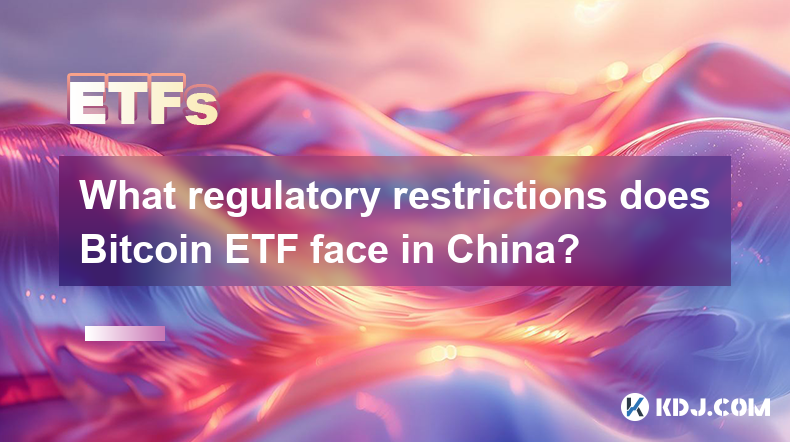
The Complex Regulatory Landscape for Bitcoin ETFs in China
China's regulatory environment presents significant hurdles for the approval and launch of a Bitcoin Exchange-Traded Fund (ETF). Unlike some jurisdictions showing increasing openness to crypto-related products, China maintains a strict stance against cryptocurrencies, viewing them with considerable skepticism. This overarching regulatory framework significantly impacts the potential for a Bitcoin ETF.
The primary challenge lies in China's outright ban on cryptocurrency trading. This ban, implemented in 2021, effectively prohibits the underlying asset of a Bitcoin ETF from being legally traded within the country. Without a functioning and regulated market for Bitcoin, the foundation for a Bitcoin ETF is inherently unstable. This directly contradicts the core principle of an ETF: providing investors with exposure to a liquid and readily tradable asset.
Furthermore, China's regulatory bodies, including the People's Bank of China (PBOC) and the China Securities Regulatory Commission (CSRC), have consistently expressed concerns about the volatility and speculative nature of cryptocurrencies. These concerns are amplified by the potential for market manipulation and money laundering associated with crypto assets. The perceived risks outweigh the potential benefits, creating a significant obstacle to ETF approval.
The regulatory framework governing investment products in China is also highly stringent. Any new financial product, including an ETF, must undergo rigorous scrutiny to ensure compliance with existing laws and regulations. The process is complex and time-consuming, requiring extensive documentation and approval from multiple regulatory authorities. This lengthy and uncertain approval process further discourages the pursuit of a Bitcoin ETF.
Beyond the direct ban on cryptocurrency trading, China's broader financial regulations present additional challenges. These regulations govern aspects such as investor protection, market integrity, and anti-money laundering measures. Meeting these requirements for a Bitcoin ETF would require significant adjustments and innovations, adding to the complexity of the process. The lack of clear legal frameworks specifically addressing cryptocurrencies exacerbates these challenges.
The absence of a clear regulatory pathway for cryptocurrencies in China also contributes to the difficulty of launching a Bitcoin ETF. While some countries are developing specific regulatory frameworks for digital assets, China has yet to provide a clear roadmap for the future of cryptocurrencies within its financial system. This lack of clarity creates uncertainty and discourages investment in related products.
Moreover, the Chinese government's focus on maintaining financial stability and controlling capital flows is a major factor. A Bitcoin ETF, given the volatility of Bitcoin, could be perceived as a threat to this stability. The government's preference for centralized control over its financial system makes the introduction of a decentralized asset like Bitcoin, even within the relatively controlled environment of an ETF, highly unlikely in the near future.
Specific Regulatory Hurdles and Their Implications
The outright ban on cryptocurrency trading: This is the most significant obstacle. Without a legal market for Bitcoin, a Bitcoin ETF is impossible. This fundamental restriction eliminates the possibility of a domestically traded Bitcoin ETF in China.
Concerns about market volatility and manipulation: The inherent volatility of Bitcoin is a major concern for regulators who prioritize market stability. This volatility is seen as a risk to investors and the broader financial system.
Anti-money laundering (AML) and know-your-customer (KYC) regulations: Meeting stringent AML and KYC requirements for a Bitcoin ETF would be challenging, given the pseudonymous nature of Bitcoin transactions. This necessitates robust mechanisms to trace transactions and identify investors, a complex task in the context of Bitcoin.
The lack of a clear regulatory framework for cryptocurrencies: The absence of specific regulations governing cryptocurrencies creates uncertainty and hinders the development of related financial products. This lack of clarity makes it difficult for potential ETF providers to navigate the regulatory landscape.
The government's preference for centralized control: China's preference for a centralized financial system conflicts with the decentralized nature of Bitcoin. This ideological clash makes the approval of a Bitcoin ETF highly improbable in the foreseeable future.
Potential Future Developments
While the current regulatory landscape in China presents significant barriers, the situation could evolve. Changes in government policy, technological advancements, or evolving international standards could potentially create a more favorable environment for Bitcoin ETFs in the future. However, any significant shift in China's stance on cryptocurrencies would require a fundamental change in its overall approach to financial regulation.
The possibility of a change remains speculative. Any future shift would likely involve a gradual easing of restrictions, a more defined regulatory framework for cryptocurrencies, and a greater understanding of the potential benefits and risks associated with Bitcoin and other digital assets.
Frequently Asked Questions
Q: Could China ever allow a Bitcoin ETF?
A: Given the current regulatory environment, the likelihood of China approving a Bitcoin ETF in the near future is extremely low. A significant shift in government policy and a fundamental change in its approach to cryptocurrency regulation would be required.
Q: What are the key regulatory bodies involved in the decision-making process for a Bitcoin ETF in China?
A: The primary regulatory bodies are the People's Bank of China (PBOC) and the China Securities Regulatory Commission (CSRC). Their approval is essential for any new financial product, including a Bitcoin ETF.
Q: What are the biggest risks associated with a Bitcoin ETF in China, from a regulatory perspective?
A: The biggest risks are the potential for market manipulation, money laundering, and the inherent volatility of Bitcoin, all of which pose challenges to maintaining financial stability.
Q: Are there any alternative ways for Chinese investors to gain exposure to Bitcoin?
A: Due to the ban on cryptocurrency trading, legal avenues for Chinese investors to directly access Bitcoin are limited. However, some may explore alternative, potentially riskier, methods outside of regulated channels. This is strongly discouraged due to the significant legal and financial risks involved.
Q: What is the global trend regarding Bitcoin ETFs, and how does China compare?
A: Globally, there's a growing trend towards the approval and listing of Bitcoin ETFs in various jurisdictions. However, China's stance remains significantly more restrictive compared to these other countries. This reflects a fundamental difference in approach to cryptocurrency regulation.
Disclaimer:info@kdj.com
The information provided is not trading advice. kdj.com does not assume any responsibility for any investments made based on the information provided in this article. Cryptocurrencies are highly volatile and it is highly recommended that you invest with caution after thorough research!
If you believe that the content used on this website infringes your copyright, please contact us immediately (info@kdj.com) and we will delete it promptly.
- RUVI, an Innovative Blockchain Project, is Aligning Artificial Intelligence with Decentralized Technology to Create Impactful Solutions
- 2025-04-02 05:25:12
- Binance Suspends USDT Spot Trading of Tether (USDT) and Other Stablecoins in the EEA
- 2025-04-02 05:25:12
- Kristin Smith, the longtime CEO of the Blockchain Association, is leaving next month to take a role as president of the new Solana Policy Institute
- 2025-04-02 05:20:12
- GoMining Launches $100M Bitcoin (BTC) Mining Fund for Institutional Investors
- 2025-04-02 05:20:12
- Larva To Moon (LARVA) Meme Coin Market Captures the Adventurous Spirit of Red and Yellow Larva Protagonists
- 2025-04-02 05:15:12
- Cardano (ADA) Founder Charles Hoskinson Opens Up About His Ties to Ripple Labs Execs
- 2025-04-02 05:15:12
Related knowledge
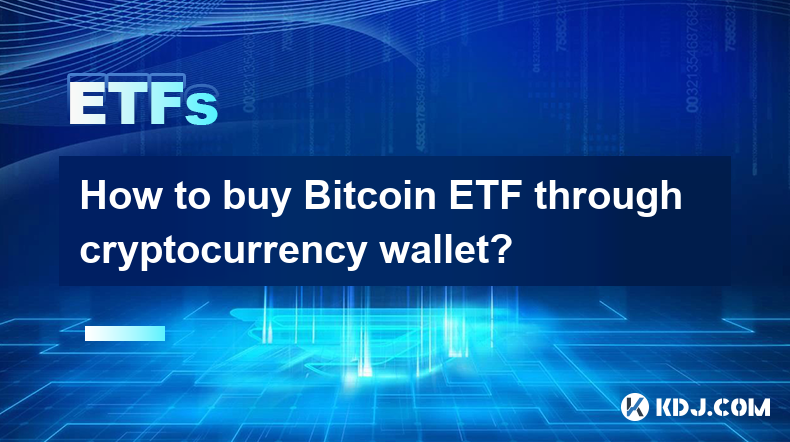
How to buy Bitcoin ETF through cryptocurrency wallet?
Mar 30,2025 at 08:22pm
It's important to understand that you cannot directly buy a Bitcoin ETF through a cryptocurrency wallet. Cryptocurrency wallets are designed to hold and manage digital assets like Bitcoin itself, not exchange-traded funds (ETFs). Bitcoin ETFs are traded on traditional stock exchanges, not decentralized cryptocurrency exchanges. Therefore, the process i...
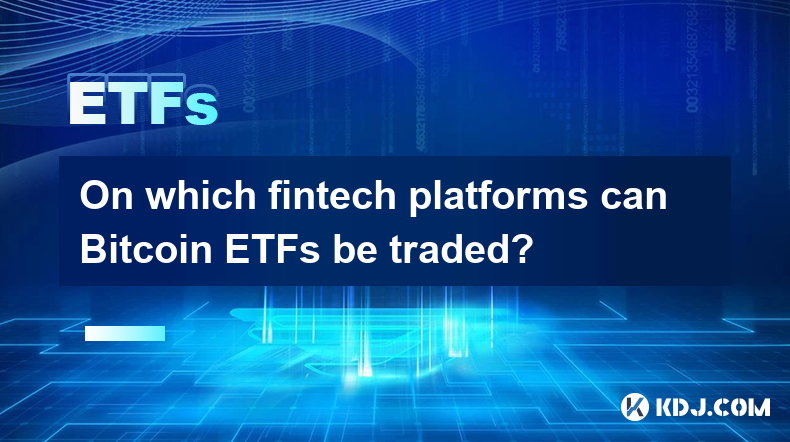
On which fintech platforms can Bitcoin ETFs be traded?
Mar 28,2025 at 09:21am
Navigating the Bitcoin ETF Landscape on Fintech PlatformsThe availability of Bitcoin ETFs on fintech platforms is a rapidly evolving landscape. Currently, the approval and subsequent listing of Bitcoin ETFs are subject to regulatory hurdles and vary significantly by jurisdiction. Therefore, the specific platforms offering Bitcoin ETF trading depend hea...
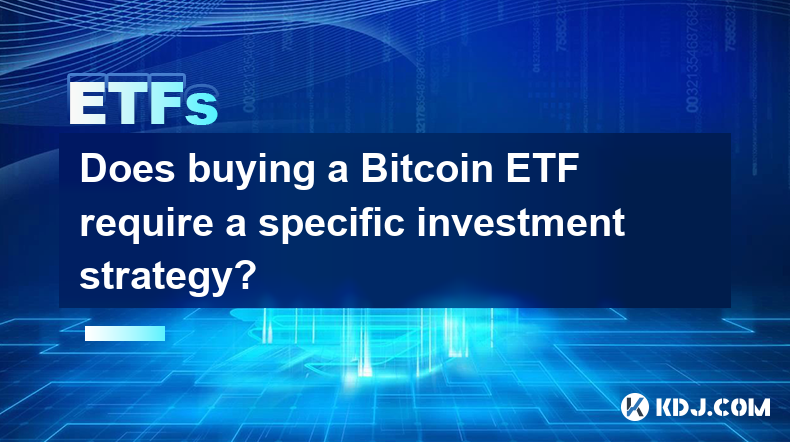
Does buying a Bitcoin ETF require a specific investment strategy?
Mar 27,2025 at 06:36pm
Understanding Bitcoin ETFs and Investment StrategiesA Bitcoin Exchange-Traded Fund (ETF) is a type of investment fund that tracks the price of Bitcoin. Investing in a Bitcoin ETF offers exposure to the cryptocurrency market without the complexities of directly owning and securing Bitcoin. However, like any investment, a successful strategy requires car...
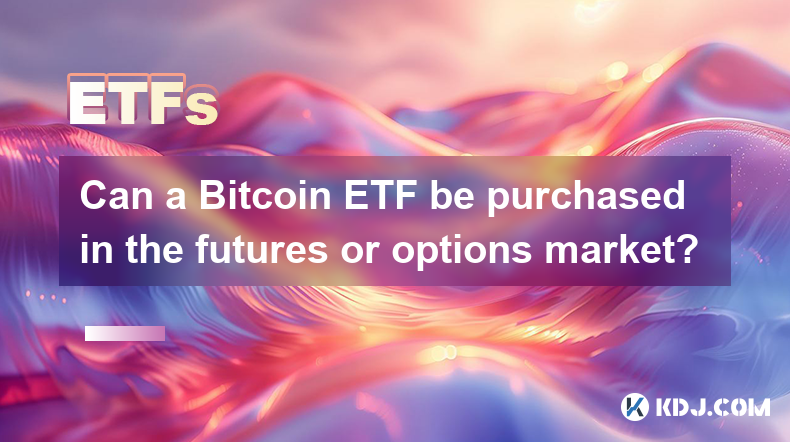
Can a Bitcoin ETF be purchased in the futures or options market?
Mar 27,2025 at 02:49am
Understanding Bitcoin ETFs and Derivative MarketsA Bitcoin ETF (Exchange-Traded Fund) is a fund that tracks the price of Bitcoin. Unlike directly buying Bitcoin, an ETF offers a more regulated and accessible way for investors to gain exposure to the cryptocurrency market through traditional brokerage accounts. However, the availability of a Bitcoin ETF...
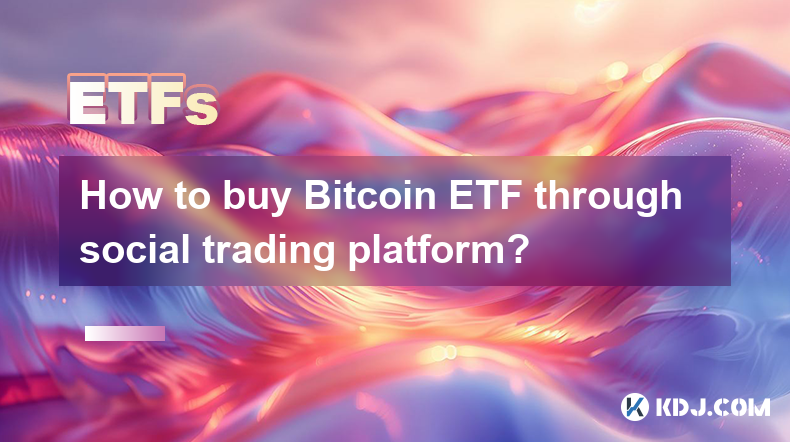
How to buy Bitcoin ETF through social trading platform?
Mar 27,2025 at 10:43am
How to Buy Bitcoin ETF Through Social Trading Platforms? Understanding Bitcoin ETFs and Social TradingA Bitcoin ETF (Exchange-Traded Fund) is a fund that tracks the price of Bitcoin. Unlike directly buying Bitcoin, an ETF offers a regulated and potentially less volatile way to gain exposure to the cryptocurrency market. This is because ETFs are traded o...
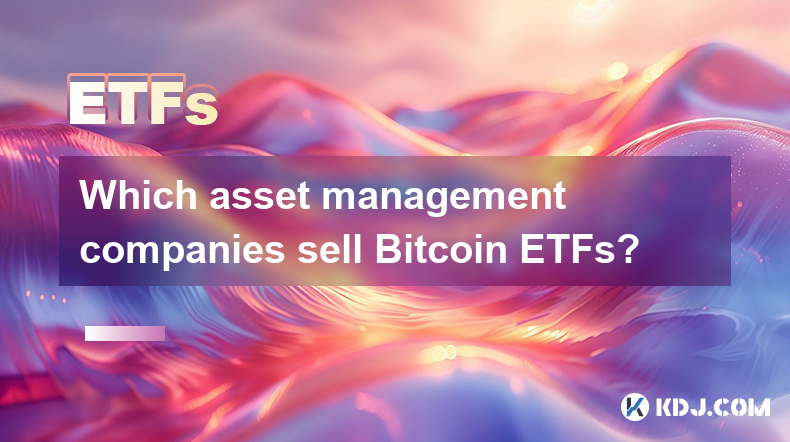
Which asset management companies sell Bitcoin ETFs?
Mar 28,2025 at 02:21am
The Current Landscape of Bitcoin ETF OfferingsCurrently, no asset management company offers a fully-fledged, SEC-approved Bitcoin ETF in the United States. While several companies have filed applications, the Securities and Exchange Commission (SEC) has yet to approve any. This is primarily due to concerns surrounding market manipulation, investor prot...

How to buy Bitcoin ETF through cryptocurrency wallet?
Mar 30,2025 at 08:22pm
It's important to understand that you cannot directly buy a Bitcoin ETF through a cryptocurrency wallet. Cryptocurrency wallets are designed to hold and manage digital assets like Bitcoin itself, not exchange-traded funds (ETFs). Bitcoin ETFs are traded on traditional stock exchanges, not decentralized cryptocurrency exchanges. Therefore, the process i...

On which fintech platforms can Bitcoin ETFs be traded?
Mar 28,2025 at 09:21am
Navigating the Bitcoin ETF Landscape on Fintech PlatformsThe availability of Bitcoin ETFs on fintech platforms is a rapidly evolving landscape. Currently, the approval and subsequent listing of Bitcoin ETFs are subject to regulatory hurdles and vary significantly by jurisdiction. Therefore, the specific platforms offering Bitcoin ETF trading depend hea...

Does buying a Bitcoin ETF require a specific investment strategy?
Mar 27,2025 at 06:36pm
Understanding Bitcoin ETFs and Investment StrategiesA Bitcoin Exchange-Traded Fund (ETF) is a type of investment fund that tracks the price of Bitcoin. Investing in a Bitcoin ETF offers exposure to the cryptocurrency market without the complexities of directly owning and securing Bitcoin. However, like any investment, a successful strategy requires car...

Can a Bitcoin ETF be purchased in the futures or options market?
Mar 27,2025 at 02:49am
Understanding Bitcoin ETFs and Derivative MarketsA Bitcoin ETF (Exchange-Traded Fund) is a fund that tracks the price of Bitcoin. Unlike directly buying Bitcoin, an ETF offers a more regulated and accessible way for investors to gain exposure to the cryptocurrency market through traditional brokerage accounts. However, the availability of a Bitcoin ETF...

How to buy Bitcoin ETF through social trading platform?
Mar 27,2025 at 10:43am
How to Buy Bitcoin ETF Through Social Trading Platforms? Understanding Bitcoin ETFs and Social TradingA Bitcoin ETF (Exchange-Traded Fund) is a fund that tracks the price of Bitcoin. Unlike directly buying Bitcoin, an ETF offers a regulated and potentially less volatile way to gain exposure to the cryptocurrency market. This is because ETFs are traded o...

Which asset management companies sell Bitcoin ETFs?
Mar 28,2025 at 02:21am
The Current Landscape of Bitcoin ETF OfferingsCurrently, no asset management company offers a fully-fledged, SEC-approved Bitcoin ETF in the United States. While several companies have filed applications, the Securities and Exchange Commission (SEC) has yet to approve any. This is primarily due to concerns surrounding market manipulation, investor prot...
See all articles























































































